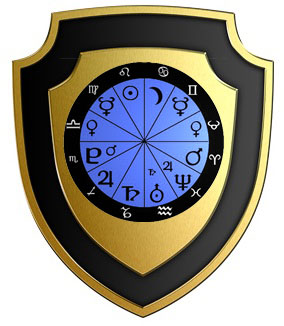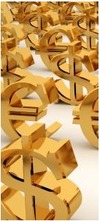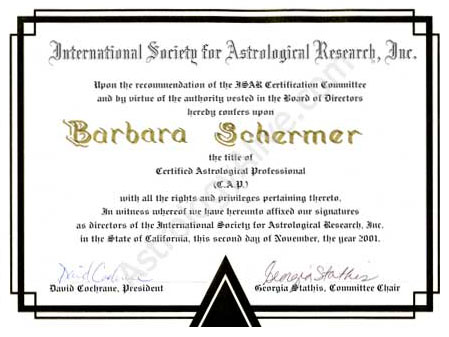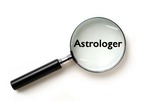
Consumers Guide to Astrologers
By Barbara Schermer
Astrology is booming! As more people become interested in having their charts done, new "astrologers" have made their presence known. Unfortunately the good ones have been joined by the bad and the downright "ugly" regarding both ethics and competence. How do you choose? Look for strengths in these four areas: technical competence, interpretive skill, counseling ability, and ethical standards.
Technical competence involves the ability to accurately and swiftly calculate a horoscope. This is an easy criterion to meet. All astrologers now use computers that provide nearly instant calculation of your birth chart.
Interpretive skills are the main reason for consulting a professional astrologer, else those computerized reports would be all anyone needed. Astrologers learn to interpret a chart by integrating the basic principles (10 planets, 12 signs, 12 houses, 5 primary aspects). The real power of their skill lies in the subtle art of synthesis of these factors into a meaningful story that you recognize as describing you or your current circumstances. I know of no astrologer who has learned interpretive synthesis other than through sheer practice and experience–and probably with a fair measure of intuition to start with. Malcolm Gladwell, in his book Outliers, are needed to master a craft—it's the same for astrologers.
Counseling ability. There are three common reasons why people approach an astrologer: out of pure curiosity, for guidance in decisions, or because they are in crisis. It doesn't take a particularly skilled astrologer to satisfy your needs if you are simply curious. More is required of a guide for your decision-making. And if you seek help with a crisis, you deserve an astrologer with well-developed counseling skills and experience. Many counseling abilities are interpersonal and thus will be apparent even in your first telephone contact with the astrologer. I advise you to talk to the prospective astrologer and do not depend on email correspondence. We learn a lot from a person's voice. Does he or she listen? Respond with empathy to your concerns? Give this kind of astrologer a try.
Ethical standards, or the lack of them, are evident even in an advertisement for astrological services. If promotional materials make extravagant claims, or the practitioner, in print or when contacted, is not straightforward about services and costs, take your business elsewhere. Be especially careful of mail order operators; a few are run by the same people who try to convince you that you have inherited riches from an unknown source.
An astrologer should not tell you what to do. Their role is to elucidate your current position, to offer possible alternatives for appropriate action, and then to leave it to you to make the actual decision. Anything more is inappropriate interference. With common sense you will easily weed out the few bad operators and have a good experience of astrology.
The best way to find a good astrologer is to get recommendations from friends whose opinion you respect. Is there one astrologer's name that keeps coming up?
If you don't know anyone who can recommend an astrologer to you, call those advertising themselves as astrologers and interview them. An email correspondence gives you little to go on. Talk to them. You can tell a lot from a person's voice. Here is what you might ask.
What kind of services do you offer? Most astrologers offer the basic services: the natal chart (a succinct character analysis), the progressed chart and current transits (current and near-future patterns in your life), and compatibility charts (comparing your natal chart with another–your boss, your spouse, etc.) Some astrologers also offer additional services, among them, electional charts (choosing the best moment to initiate an important action such as a marriage or business opening), horary charts (to answer a specific question) or computer-generated chart reports (a twenty-or-so page report "interpreting" your horoscope. Reports are inexpensive and not a bad way for beginning astrology students to learn the basic meanings of their own chart, but they are not as integrated or thorough as a professional consultation.)
 How much do you charge? Most professional astrologers charge anywhere from $100 to $300 a session depending upon the service. (Comparison or compatibility charts cost more because there is more work involved.) You might expect to pay about $100 (or less) to an astrologer just starting out. The average fee is around $150, and higher fees are charged by astrologers with years of experience and proven track records.) Reports delivered via email vary from free to $50 depending on the quality.
How much do you charge? Most professional astrologers charge anywhere from $100 to $300 a session depending upon the service. (Comparison or compatibility charts cost more because there is more work involved.) You might expect to pay about $100 (or less) to an astrologer just starting out. The average fee is around $150, and higher fees are charged by astrologers with years of experience and proven track records.) Reports delivered via email vary from free to $50 depending on the quality.
What can I expect for my money? Most astrologers record the session for you and give you a copy of your natal chart (paper or JPEG file delivered via email). Most also email you a link that lets you download your session to your computer (useful for transfer to your iPhone or music player) or offer you a session via Skype. Important—If the session is not recorded, the details quickly fade from memory. Most astrologers offer phone consultations and pick up the phone costs. Voice interaction via phone or sitting face to face (or with Skype, if you already know to us it!) gives you the best results.
What is your background in astrology and in counseling? This information is more difficult to interpret. Most astrologers are initially self-taught or have begun studies with a qualified teacher. Beyond that many will have studied astrology intensively with professional astrology associations or schools that offers certification.
Other questions. If you have a specific problem you'd like help with, tell the astrologer that. Do they have experience dealing with this issue? If not, can they refer you to one of their colleagues skilled in this particular area (for instance a medical astrologer?) Don't hesitate to ask your own questions, but balance your inquisitiveness with a respect for the astrologer's time.
About Credentials
Astrology today is not licensed though there is some regulation. There are credentials that can give you some assurance. For instance, several astrology organizations confer credentials in the US. The National Council of Geo-Cosmic Research-Professional Astrologers Alliance, (NCGR-PAA) offers four levels of testing to their members, with level four representing a professional certification, and members sign a code of ethics. Another organization, the International Society for Astrological Research (ISAR), certifies applicants in ethics, counseling skills, and competence with astrological methods.

There are many excellent schools around the world training the next generation of astrologers. Examples are Kepler College in Seattle, which has offered both bachelor and master degree programs (though it appears to have lost its struggle to become a fully-accredited academic institution), the Sophia Center at the University of Wales, the Avalon School of Astrology in Florida, the Chiron Center in Melbourne Australia. Also the International Academy of Astrology (IAA) is an excellent online program. Google searches can get you started.
Most people have a very satisfying first experience with a professional astrology consultation. But, as in any field, there are some opportunists, some incompetents, and even a few rip-off artists. As in all dealings in the marketplace, let the buyer beware. With this information, you will have a better chance to find an astrologer who represents the finest in our field—competent and skilled, with dedication and integrity.—Barbara.

